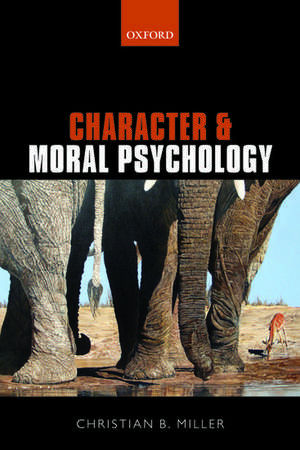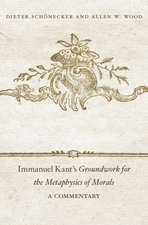Character and Moral Psychology
Autor Christian B. Milleren Limba Engleză Paperback – 7 ian 2016
| Toate formatele și edițiile | Preț | Express |
|---|---|---|
| Paperback (1) | 257.00 lei 31-37 zile | |
| OUP OXFORD – 7 ian 2016 | 257.00 lei 31-37 zile | |
| Hardback (1) | 529.52 lei 31-37 zile | |
| OUP OXFORD – 9 ian 2014 | 529.52 lei 31-37 zile |
Preț: 257.00 lei
Preț vechi: 297.98 lei
-14% Nou
Puncte Express: 386
Preț estimativ în valută:
49.18€ • 51.16$ • 40.60£
49.18€ • 51.16$ • 40.60£
Carte tipărită la comandă
Livrare economică 03-09 aprilie
Preluare comenzi: 021 569.72.76
Specificații
ISBN-13: 9780198768739
ISBN-10: 0198768737
Pagini: 288
Dimensiuni: 157 x 231 x 16 mm
Greutate: 0.43 kg
Editura: OUP OXFORD
Colecția OUP Oxford
Locul publicării:Oxford, United Kingdom
ISBN-10: 0198768737
Pagini: 288
Dimensiuni: 157 x 231 x 16 mm
Greutate: 0.43 kg
Editura: OUP OXFORD
Colecția OUP Oxford
Locul publicării:Oxford, United Kingdom
Recenzii
The book is likely to advance the reader along new, interesting, and insightful lines. It is exceptionally lucid, it offers a good summary of Miller's thinking as well as the contemporary philosophical and psychological approaches to character, and it constantly appeals to our commonsensical understanding of virtue.
Christian Millers work on character satisfies on all levels: it is novel yet commonsensical; it is meticulously researched yet explained with ease. It crosses seamlessly between disciplinary boundaries. Indeed, one often feels that Miller is not doing interdisciplinary research, in the sense of crossing from one discipline to the next, but is instead building a science of character in itself. In this respect, Character and Moral Psychology serves as a model for the science of character and for continued work that lies at the intersection of philosophy and psychology.
Miller's book (and the companion volume referred to above) is and ought to be required reading for everyone working on problems and questions in the interface between moral philosophy and (empirical) moral psychology. Not only does Miller provide the best and most up to date overview of the field that I know of. He also moves the discussion further, raises new and interesting questions and helps to steer the debate away from a number of dead ends.
Christian Miller's book, together with its companion volume, Moral Character (2013), is among the most substantial -- and among the very best -- contributions to the virtue ethics and situationism debate.
Christian B. Miller is an astute analytic philosopher who can be relied upon to write penetratingly about any subject he addresses . . . Miller tackles quite specific questions, mostly having to do with situationist challenges to the notion of moral character; but he does so with a degree of clarity, insight and originality rarely seen before in the field . . . This is one of those books that is difficult to overpraise.
Christian Miller's two volumes, Moral Character: An Empirical Theory and Character and Moral Psychology, offer a comprehensive review of psychological research and theory concerning moral character traits and the influence of situational variables on moral behavior. They are essential reading for psychologists and philosophers whose work concerns moral character, moral development, or moral action. Miller challenges long accepted understandings of virtue and vice, offering a novel alternative grounded in recent empirical research.
Christian Millers work on character satisfies on all levels: it is novel yet commonsensical; it is meticulously researched yet explained with ease. It crosses seamlessly between disciplinary boundaries. Indeed, one often feels that Miller is not doing interdisciplinary research, in the sense of crossing from one discipline to the next, but is instead building a science of character in itself. In this respect, Character and Moral Psychology serves as a model for the science of character and for continued work that lies at the intersection of philosophy and psychology.
Miller's book (and the companion volume referred to above) is and ought to be required reading for everyone working on problems and questions in the interface between moral philosophy and (empirical) moral psychology. Not only does Miller provide the best and most up to date overview of the field that I know of. He also moves the discussion further, raises new and interesting questions and helps to steer the debate away from a number of dead ends.
Christian Miller's book, together with its companion volume, Moral Character (2013), is among the most substantial -- and among the very best -- contributions to the virtue ethics and situationism debate.
Christian B. Miller is an astute analytic philosopher who can be relied upon to write penetratingly about any subject he addresses . . . Miller tackles quite specific questions, mostly having to do with situationist challenges to the notion of moral character; but he does so with a degree of clarity, insight and originality rarely seen before in the field . . . This is one of those books that is difficult to overpraise.
Christian Miller's two volumes, Moral Character: An Empirical Theory and Character and Moral Psychology, offer a comprehensive review of psychological research and theory concerning moral character traits and the influence of situational variables on moral behavior. They are essential reading for psychologists and philosophers whose work concerns moral character, moral development, or moral action. Miller challenges long accepted understandings of virtue and vice, offering a novel alternative grounded in recent empirical research.
Notă biografică
Christian Miller is Associate Professor of Philosophy at Wake Forest University. His main areas of research are meta-ethics, moral psychology, moral character, action theory, and philosophy of religion. He is also the author of Moral Character: An Empirical Theory (OUP 2013), and the editor of The Continuum Companion to Ethics (Continuum 2011) and Essays in the Philosophy of Religion (OUP 2006). His work has appeared in such journals as Noûs, Philosophy and Phenomenological Research, Philosophical Studies, Philosophical Psychology, The Journal of Ethics, Journal of Ethics and Social Philosophy, and Oxford Studies in Philosophy of Religion. He is the director of The Character Project (www.thecharacterproject.com), which is funded by a substantial grant for the study of character from the John Templeton Foundation.
























